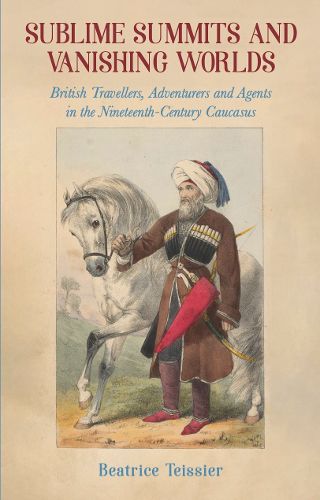Readings Newsletter
Become a Readings Member to make your shopping experience even easier.
Sign in or sign up for free!
You’re not far away from qualifying for FREE standard shipping within Australia
You’ve qualified for FREE standard shipping within Australia
The cart is loading…






The Caucasus has long suffered the impact of Russian colonialism - enforced with particular brutality in the nineteenth century. This military and cultural domination provided the background to growing British interest in what had hitherto been largely 'terra incognita'.
Beatrice Teissier explores Britain's involvement through the eyes of visitors, consuls and other observers who travelled from the Black Sea coast to the Caucasus mountain chains, to Chechnya, Dagestan and even the Caspian. At first alarmed at Russia's expansion in territory previously under Ottoman and Persian control, the British toyed with the idea of supporting Circassian independence, and later rebels in Dagestan, in order to gauge whether 'tribal' people could fight against Russia and thus serve the British Empire. This attracted agents and partisans to the cause.
But times changed. After the Crimean War and the 'pacification' of the mountain people, consuls were established on the Black Sea coast and the area opened up to adventure and tourism. Consuls sent back reports on issues such as the ethnic cleansing of Circassians, Abkhazians and others, the Russo-Turkish War of 1877- 78, rising authoritarianism and Russia's appetite for war. Pragmatic as ever, they also reported on ongoing trade relations with Britain.
Other travellers included politically engaged individuals, exercised by the plight of the Armenians, the rise of nationalism and the prospect of an independent Georgia. Others had specific interests such as ethnography, antiquarianism, competitive mountaineering and hunting. All reported on life in the Caucasus, from urban Tiflis (now Tbilisi) to poor, remote villages, where feudal communities facing the incursions of Russian administration. Spectacular scenery, local customs and the plight of threatened minorities are recurring motifs in the writing of researchers and tourists alike.
Arranged by region and thematically, this book explores the vagaries of British foreign policy, ethnographic and antiquarian observation, record- breaking mountaineering and the ways in which travellers used illustrations and photography to project their view of the Caucasus and of themselves. Relevant in the context of Moscow's current policy and continued unrest in a contested region, this is a timely and accessible account of formative British attitudes to the Caucasus and Russia's sphere of influence.
$9.00 standard shipping within Australia
FREE standard shipping within Australia for orders over $100.00
Express & International shipping calculated at checkout
The Caucasus has long suffered the impact of Russian colonialism - enforced with particular brutality in the nineteenth century. This military and cultural domination provided the background to growing British interest in what had hitherto been largely 'terra incognita'.
Beatrice Teissier explores Britain's involvement through the eyes of visitors, consuls and other observers who travelled from the Black Sea coast to the Caucasus mountain chains, to Chechnya, Dagestan and even the Caspian. At first alarmed at Russia's expansion in territory previously under Ottoman and Persian control, the British toyed with the idea of supporting Circassian independence, and later rebels in Dagestan, in order to gauge whether 'tribal' people could fight against Russia and thus serve the British Empire. This attracted agents and partisans to the cause.
But times changed. After the Crimean War and the 'pacification' of the mountain people, consuls were established on the Black Sea coast and the area opened up to adventure and tourism. Consuls sent back reports on issues such as the ethnic cleansing of Circassians, Abkhazians and others, the Russo-Turkish War of 1877- 78, rising authoritarianism and Russia's appetite for war. Pragmatic as ever, they also reported on ongoing trade relations with Britain.
Other travellers included politically engaged individuals, exercised by the plight of the Armenians, the rise of nationalism and the prospect of an independent Georgia. Others had specific interests such as ethnography, antiquarianism, competitive mountaineering and hunting. All reported on life in the Caucasus, from urban Tiflis (now Tbilisi) to poor, remote villages, where feudal communities facing the incursions of Russian administration. Spectacular scenery, local customs and the plight of threatened minorities are recurring motifs in the writing of researchers and tourists alike.
Arranged by region and thematically, this book explores the vagaries of British foreign policy, ethnographic and antiquarian observation, record- breaking mountaineering and the ways in which travellers used illustrations and photography to project their view of the Caucasus and of themselves. Relevant in the context of Moscow's current policy and continued unrest in a contested region, this is a timely and accessible account of formative British attitudes to the Caucasus and Russia's sphere of influence.